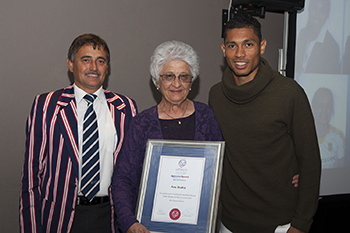
Tannie Ans Botha, Wayde van Niekerk’s coach,
received a special award from KovsieSport
at the annual Sport Stars Awards ceremony.
From the left, are: DB Prinsloo, Director of
KovsieSport, Botha, and Van Niekerk.
Photo: Hannes Naude
The choice of Wayde van Niekerk as Sportsman of the Year was no surprise, but with this fourth consecutive title he joins select company at the University of the Free State (UFS). The 400 m Olympic champion equalled Franz Kruger’s record for the highest number of successive sports awards for men.
In total, Kruger (discus) was named Sportsman of the Year five times – 1997, 1998, 1999, 2000 and 2002. He is also the most awarded Kovsie sportsman.
Blose and Puren rewarded as junior stars
On 20 October 2016, Van Niekerk and the Protea netball player Karla Mostert were honoured as Sportsman and Sportswoman of the Year at Leopards & Lace in Bloemfontein for a second consecutive year.
It was only the second time that KovsieSport awarded the same sports stars two years in a row – formerly it was Van Niekerk and the Protea netball captain, Maryka Holtzhausen (2013 and 2014).
Kwenzo Blose, who played for the South Africa U20 rugby team at the Junior World Cup, was named Junior Sportsman. The South Africa U21 netball captain Alicia Puren, who helped her team qualify for the 2017 U21 World Cup tournament, was crowned Junior Sportswoman for 2016.
“Wayde van Niekerk gained
unprecedented international
fame, which added untold
value to the KovsieSport
brand.”
Prinsloo proud of high quality
According to DB Prinsloo, director of KovsieSport, his department is proud of the high quality of its sports stars. “Wayde van Niekerk gained unprecedented international fame, which added untold value to the KovsieSport brand. Although Karla Mostert might have experienced tougher opposition from her fellow nominees, she was a real star for the Protea netball team.”
To be awarded, a sports star should be a registered UFS student and comply with specific academic requirements. Van Niekerk (BA Marketing), Mostert (masters in Dietetics), Blose (BA Law), and Puren (Education) meet these requirements.
In order to determine the winners, KovsieSport also uses criteria such as international participation, a contribution to UFS awareness, and excellence in sport.
“To be awarded, a sports star
should be a registered UFS
student and comply with specific
academic requirements.”
Cronjé still holds overall record
Sarina Cronjé holds the record for the most successive UFS awards (five).
Cronjé, a Springbok track and cross-country athlete, was Sportswoman of the Year from 1977 to 1981. The number of titles held by this senior officer at KovsieSport is the most by a woman.